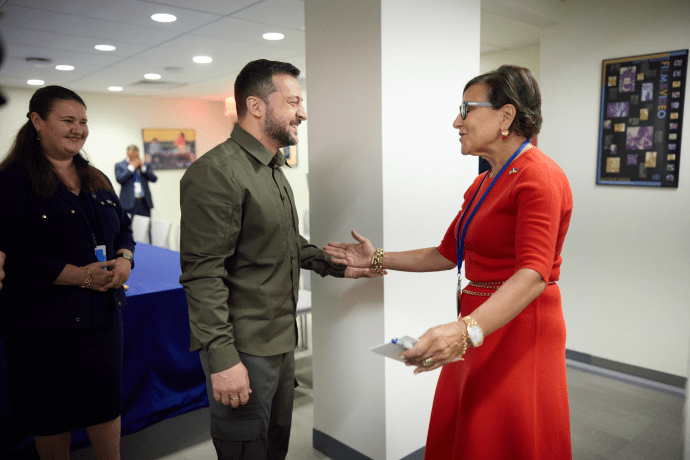
Joint Statement on the U.S.-New Zealand Space Dialogue
The following joint statement was released by the Governments of the United States and New Zealand on the occasion of the U.S.-New Zealand Space Dialogue.
Pursuant to the desire of the Government of The United States of America and the Government of New Zealand, the countries held a bilateral Space Dialogue in Washington, D.C. on April 12, 2024, to strengthen bilateral space cooperation. The Space Dialogue demonstrates the robust and growing cooperation between the United States and New Zealand in outer space.
The U.S. delegation was led by Rahima Kandahari, Deputy Assistant Secretary, Bureau of Oceans and International Environmental and Scientific Affairs and the New Zealand delegation was led by Iain Cossar, Head of the New Zealand Space Agency. Chirag Parikh, Deputy Assistant to the President and Executive Secretary, U.S. National Space Council, delivered opening remarks. Both delegations included whole of government participation.
The participants welcomed the holding of this inaugural Dialogue during the 150th anniversary of the space relationship between the two countries, commemorating the work of two visiting American scientific parties and their New Zealand collaborators during the 1874 Transit of Venus.
A significant focus of the Dialogue was on the growth of the commercial space sector, to include the changing role of government in commercial space, and a growing range for commercial activities. Both sides expressed their intent to continue cooperation on a range of issues including launch, payloads, and space situational awareness.
The delegations recognized the potential for expanded cooperation on policy and regulatory interoperability related to commercial space, including launch and reentry, commercial remote sensing, and spectrum frequency management. Both sides also discussed opportunities to advance scientific education, research, and space cooperation between the countries.
Participants welcomed the open and productive nature of the Dialogue, which included discussion on space cooperation within international multilateral organizations, including supporting the work of the United Nations Committee on the Peaceful Uses of Outer Space and other UN bodies. Both sides emphasized the importance of promoting peaceful, sustainable behavior in outer space.
Participants acknowledged that New Zealand’s geographic advantages has enabled frequent and responsive launch for U.S. industry and government agencies, adding strategic resilience to launch capacity. New Zealand’s location has enabled hosting of ground-based infrastructure to enhance both space situational awareness and communications with space craft. New Zealand has also provided a base for important scientific programs, including the NASA Scientific Balloon Program’s super pressure balloon flights from Wanaka and, previously, the southern hemisphere flights of the SOFIA airborne observatory.
Both sides welcomed the signing of an updated Memorandum of Cooperation between the New Zealand Space Agency and the Federal Aviation Administration during Space Symposium. Participants recognized the success of this regulatory partnership which facilitated robust regulation of the world’s fourth highest equal orbital launch cadence in New Zealand.
Participants observed the significant relationship milestones of the entry into force of the bilateral Space Cooperation Framework Agreement as well as the visit to New Zealand in 2023 of the Administrator and Deputy Administrator of NASA which led to New Zealand’s deepening science, technology and educational connections with NASA.
They welcomed the announcement of the first round of joint research projects between New Zealand research institutes and NASA centers, focusing on Earth observation. These projects lay the foundation for future collaborations in other research areas, including contributions to the Artemis program.
The New Zealand delegation expressed its appreciation for the opportunities unlocked for high achieving students through the internships hosted by NASA and by the NASA Jet Propulsion Laboratory since 2019.
Participants welcomed the launch of MethaneSAT, noting the unique partnership involving the New Zealand government, a US not-for-profit entity, academic and research institutions, and commercial organizations in both countries. They looked forward to the data from the mission being exploited to enhance understanding of anthropogenic methane emissions and for taking action to mitigate global warming.
Preceding the government-to-government discussions, both sides held a commercial roundtable on the margins of 39th Space Symposium in Colorado Springs, CO which brought together over a dozen private space companies from each of the two countries and highlighted existing partnerships. The Roundtable was co-chaired by the Hon. Judith Collins, New Zealand Minister for Space, and Richard DalBello, Director of the U.S. Department Commerce’s Office of Space Commerce. The session allowed industry representatives to better understand how the United States and New Zealand promote their respective commercial space sectors and to outline opportunities and challenges for stronger bilateral cooperation. Participants welcomed reciprocal investment into each other’s space sectors. Existing partnerships were examined to help boost ties between the two commercial space sectors.
Both countries are determined to continue work in the areas mentioned above and to explore other opportunities for strengthening bilateral cooperation to include facilitating bilateral commercial connections.
Official news published at https://www.state.gov/joint-statement-on-the-u-s-new-zealand-space-dialogue/
The post Joint Statement on the U.S.-New Zealand Space Dialogue first appeared on Social Gov.
United States - Social Gov originally published at United States - Social Gov






